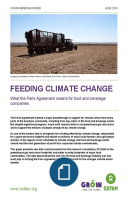Feeding climate change: what the Paris Agreement means for food and beverage companies
Feeding climate change: what the Paris Agreement means for food and beverage companies

The Paris Agreement marked a major breakthrough in support for climate action from many parts of the business community, including from key actors in the food and beverage sector. But despite significant progress, much work remains both to cut greenhouse gas emissions and to support the millions of people already hit by climate change. As one of the sectors that is at highest risk of being affected by climate change, responsible for a giant emissions footprint and reliant on millions of small-scale farmers and agricultural workers in the regions most vulnerable to climate change, the food and beverage sector should lead the next generation of post-Paris corporate climate commitments. This paper presents new data commissioned from the research consultancy CE Delft on the greenhouse gas emissions footprints and water scarcity footprints of major food commodities. The data demonstrate the vital role the food and beverage industry can and must play in turning the Paris Agreement into a springboard for the stronger climate action needed.







